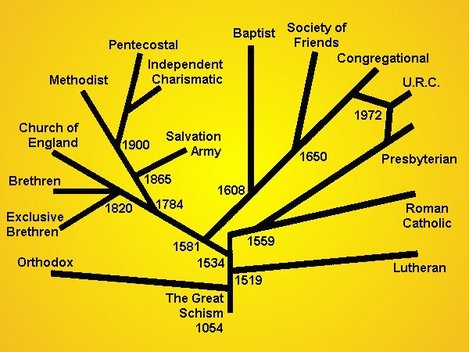Ecumenism
|
Christian communities interact with each other
|
| ||||||

Ecumenism mainly refers to initiatives aimed at greater Christian unity or cooperation. It is used predominantly by and with reference to Christian denominations and Christian Churches separated by doctrine, history, and practice. Within this particular context, the term ecumenism refers to the idea of a Christian unity in the literal meaning: that there should be a single Christian Church.
The word is derived from Greek οἰκουμένη (oikoumene), which means "the whole inhabited world", and was historically used with specific reference to the Roman Empire. The ecumenical vision comprises both the search for the visible unity of the Church (Ephesians 4.3) and the 'whole inhabited earth' (Matthew 24.14) as the concern of all Christians.
The Ecumenical Movement in Australia
|
The National Council of Churches is 15 Christian Churches, gathered from across this wide brown land, who have embarked on a pilgrimage together. We each bring a widely varied history of place, experience, and theology, but we share a common faith and confession in the Lord Jesus Christ as God and Saviour. We also share a common future as we are convinced that the future of Christians in Australia lies together, not in separation
|
A brief history of the NCCA
The modern ecumenical movement began to take shape as the 19th century drew to a close. Initiatives among students and between Church mission agencies led the way. This country saw the formation of the Australian Student Christian Movement (1896) and the National Missionary Council (1926).
Out of the devastation of World War II sprang the Australian Committee for the World Council of Churches (1946). This developed into the Australian Council of Churches which, in 1994, gave way to the National Council of Churches in Australia.
The movement for Christian unity in this country was, initially, an Anglican and Protestant affair. Eastern and Oriental Orthodox Churches came in, in strength, during the 1960s and 70s. For Catholics, the Second Vatican Council (Vatican II) opened up fresh possibilities for relationships with other Churches, and the transition to the National Council of Churches in Australia (1994) saw the Catholic Church become a full participant in Australia's national ecumenical body.
The NCCA is its nineteen member Churches in their commitment each to the others and all to the world for which Christ died. It works in collaboration with state ecumenical councils around Australia. It is an associate council of the World Council of Churches, a member of the Christian Conference of Asia and a partner of other national ecumenical bodies throughout the world.
The modern ecumenical movement began to take shape as the 19th century drew to a close. Initiatives among students and between Church mission agencies led the way. This country saw the formation of the Australian Student Christian Movement (1896) and the National Missionary Council (1926).
Out of the devastation of World War II sprang the Australian Committee for the World Council of Churches (1946). This developed into the Australian Council of Churches which, in 1994, gave way to the National Council of Churches in Australia.
The movement for Christian unity in this country was, initially, an Anglican and Protestant affair. Eastern and Oriental Orthodox Churches came in, in strength, during the 1960s and 70s. For Catholics, the Second Vatican Council (Vatican II) opened up fresh possibilities for relationships with other Churches, and the transition to the National Council of Churches in Australia (1994) saw the Catholic Church become a full participant in Australia's national ecumenical body.
The NCCA is its nineteen member Churches in their commitment each to the others and all to the world for which Christ died. It works in collaboration with state ecumenical councils around Australia. It is an associate council of the World Council of Churches, a member of the Christian Conference of Asia and a partner of other national ecumenical bodies throughout the world.
AUSTRALIAN CHRISTIAN CHURCHES: COVENANTING TOGETHER
DECLARATION OF INTENT
As member churches of the National Council of Churches in Australia,
DECLARATION OF INTENT
As member churches of the National Council of Churches in Australia,
- We RE-AFFIRM our commitment to one another as partners on the ecumenical journey;
- We BELIEVE that we are being blessed in our generation to witness the action of the Spirit in drawing the Churches in a common search for a fuller expression of unity;
- We REJOICE in all we have in common and GIVE THANKS for the richness of our diversity, though recognising that our disunity is a hindrance to the Church’s mission;
- We RECOGNISE ONE ANOTHER as Communities of Faith, Hope and Love, committed to following Christ and pledged to serve God’s kingdom;
- We therefore MAKE A COMMITMENT TO EACH OTHER to engage in an ongoing process of growing together (covenanting), not knowing what visible form unity, which is God’s will and gift, may take, but believing that, by taking the steps to which we now commit ourselves, we shall be led to grow ever more deeply into that unity.
ACTIVITY: WEBSITE RESEARCH of NCCA
|
SIMPLE QUESTIONS
|
DEEPER RESEARCH
Select one of the departments of NCCA on the tab "Our Works"
|
EVALUATIVE RESEARCH
Write a reflection of your thoughts on ecumenism, consider:
|


